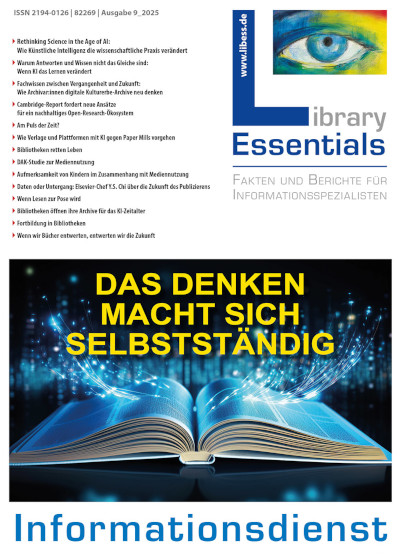 WEITERE NEWS
WEITERE NEWS
- Digital Commons EDIC launches to advance Europe’s technological sovereignty | Shaping Europe’s digital future
- Von Choralbüchern bis YouTube: Culture Music Award 2025 zeichnet innovative Musikforschung aus
- Astrid Lambrecht in den Rat für Informationsinfrastrukturen berufen – RfII
- Beta-Phase beendet: KFiD verabschiedet KDSF 2.0
- DNB Fachtagung – KI in Bibliotheken weiterdenken – 29./30.1.2026
- Steno, Papyrus, Holz: KI soll wertvolle Schriften entschlüsseln
- Gottfried Wilhelm Leibniz-Preise 2026
- TIB-Report 2025 erschienen

Aktuelles aus
L
ibrary
Essentials
In der Ausgabe
- Rethinking Science in the Age of AI: Wie Künstliche Intelligenz die wissenschaftliche Praxis verändert
- Warum Antworten und Wissen nicht das Gleiche sind: Wenn KI das Lernen verändert
- Fachwissen zwischen Vergangenheit
und Zukunft: Wie Archivar:innen digitale Kulturerbe-Archive neu denken - Cambridge-Report fordert neue Ansätze für ein nachhaltiges Open-Research-Ökosystem
- Wie Verlage und Plattformen
mit KI gegen Paper Mills vorgehen - Bibliotheken retten Leben
- Aufmerksamkeit von Kindern
im Zusammenhang mit Mediennutzung - Daten oder Untergang: Elsevier-Chef Y.S. Chi über die Zukunft des Publizierens
- Bibliotheken öffnen ihre Archive
für das KI-Zeitalter - Wenn wir Bücher entwerten,
entwerten wir die Zukunft

fachbuchjournal























































